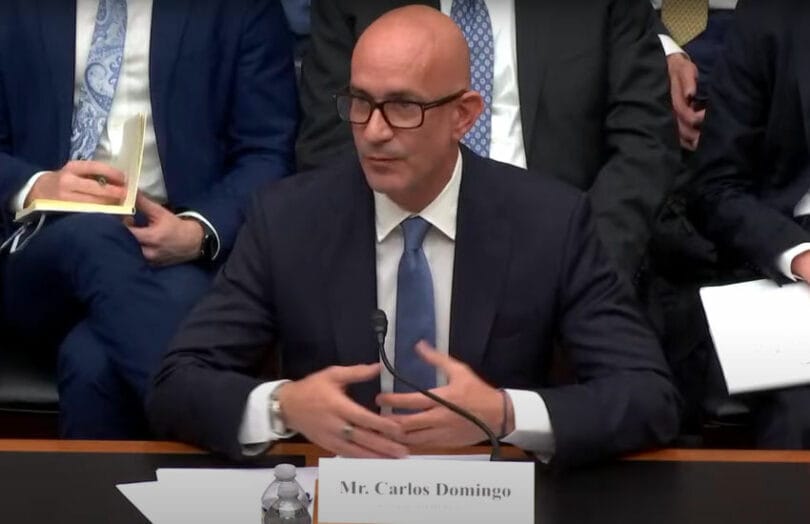The questioning covered a wide range of potential use cases, benefits, and risks of tokenization. Key themes included the need for clear regulation, the importance of maintaining robust controls and consumer protections, and the potential for tokenization to streamline complex financial transactions and help smaller banks compete. However, concerns were also raised about the limitations of public blockchains and the need to keep tokenization separate from the more speculative crypto ecosystem.
Carlos Domingo, Co-founder and CEO of Securitize:
Testimony: Securitize is a leader in compliant tokenization of financial assets, focusing on private capital markets. Legislative efforts should focus more on enabling traditional financial products to benefit from tokenization. He provided specific suggestions for regulatory clarity needed around issues like the definition and custody requirements for tokenized securities.Questioning: Domingo discussed how tokenization can improve dividend payouts and capital flows between companies and investors. He clarified that Securitize's platform has robust controls in place for KYC/AML and transfer restrictions, countering concerns raised about a tokenized BlackRock money market fund.
Questioning: Domingo discussed how tokenization can improve dividend payouts and capital flows between companies and investors. He clarified that Securitize's platform has robust controls in place for KYC/AML and transfer restrictions, countering concerns raised about a tokenized BlackRock money market fund.
Nadine Chakar, Global Head of DTCC Digital Assets at the Depository Trust and Clearing Corporation
Testimony: DTCC is working to integrate tokenization capabilities with their existing market infrastructure, but it will take time and require careful coordination between stakeholders. The same principles of "same activity, same risk, same regulation" should apply to tokenized assets.
Questioning: Chakar noted that while the U.S. has a more homogenous market structure than other countries, progress on tokenization has still faced some regulatory challenges. Constant dialogue and granular problem-solving with regulators is needed.
Robert Morgan, CEO of the USDF Consortium
Testimony: Tokenizing bank deposits using blockchain can enable faster, cheaper, more programmable payments and atomic settlement, while maintaining regulatory protections. It can especially benefit smaller/community banks. However, regulatory uncertainty is limiting banks' ability to adopt tokenization.
Questioning: Morgan explained how tokenized deposits could streamline complex multi-party transactions like construction loans and allow community banks to partner on larger loans. He emphasized that USDF's private blockchain system still has robust controls and would be fully auditable.
Lilya Tessler, Partner at Sidley Austin LLP
Testimony: Tokenization offers benefits like efficiency, risk mitigation, liquidity and programmability without changing the underlying asset itself. However, current regulatory guidance lacks clarity and flexibility for market participants to fully leverage tokenization.
Questioning: Tessler discussed potential applications of tokenization for supply chain traceability, event ticketing, and real estate, leveraging blockchain's transparency and programmability. She agreed that the SEC's SAB 121 guidance hinders tokenization by treating tokenized securities differently than traditional ones.
Prof. Hilary Allen, Professor of Law at American University Washington College of Law:
Testimony: Allen argued that public, permissionless blockchains are too inefficient and fragile to support tokenized real-world assets. She warned against using tokenization to integrate traditional finance with the crypto ecosystem. While tokenization could increase market efficiencies, it may not do much for financial inclusion and could introduce new fragilities.
Questioning: Allen reiterated concerns about stablecoins as a settlement asset and the need for a central bank digital currency as a tokenized settlement asset. She cautioned that removing too many intermediaries and automating transactions through tokenization could amplify shocks in a crisis.

